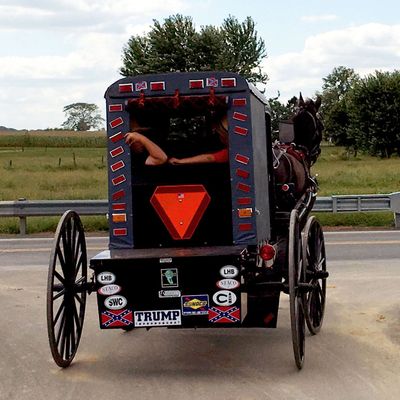
It’s inevitable that Republicans would try to mobilize a deeply conservative, religious Christian community that is concentrated in battleground states and massively under-participate in elections. That’s happened in the recent past, and it’s happening again heading toward 2020, especially in Pennsylvania, where the Old Order Amish (a famously traditionalist branch of the Mennonite Anabaptist tradition) live in significant numbers. The Washington Post reports on this latest drive to get the Amish to the polls on behalf of the GOP’s heathenish warlord:
In 2016, when more than 6 million Pennsylvanians voted in the presidential election, the state’s 20 pivotal electoral votes were decided by a margin of less than 45,000 voters.
Pennsylvania is home to more than 75,000 Amish people, and most who are eligible don’t vote.
For two Republican operatives, those two numbers together add up to one major opportunity — to convince the traditionally reluctant Amish to come out to the polls, where their votes might be tremendously influential. Their project, which started in 2016 with billboards and newspaper ads urging Amish people to vote for Donald Trump, goes by the name Amish PAC.
The 2016 effort didn’t gain much ground, as the Economist noted a couple of years later:
The Amish are members of a devoutly religious community with Swiss-German roots who rely on themselves. They do not pay Social Security taxes and lack health insurance. When somebody falls badly ill, the community chips in to pay for care. “They are the original Tea Party,” says Donald Kraybill of Elizabethtown College in Pennsylvania.
Unlike the Tea Party movement, though, the 300,000-strong Amish are almost politically irrelevant. The church does not encourage voting, and only around one in ten eligible Amish voters go to the polls. As an Amish saying goes: “We don’t vote, but we pray Republican”…
A campaign to get out the Amish vote for George W. Bush seems to have worked in 2004. By comparison, the effort in 2016 failed. A study of Lancaster County in Pennsylvania by Elizabethtown College’s Young Centre for Anabaptist and Pietist Studies found that Amish turnout in 2016 was 24% lower than in 2004, even though the number of eligible Amish voters was much higher.
The two Bush presidents actually visited the Pennsylvania Amish community centered in Lancaster County, and W. was known for his personal piety. Presumably Amish PAC thinks the highly polarized atmosphere of the 2020 election will get these exemplars of cultural conservatism to the polls.
The PAC, which spent nearly $140,000 in 2016 and has raised $32,000 so far for 2020, according to campaign finance records, mostly focuses on advertising in heavily Amish areas of Pennsylvania and Ohio. In 2016, their “VOTE TRUMP” billboards showed a picture of an Amish buggy with the words, “Hard Working, Pro-Life, Family Dedicated … Just Like YOU.”
The group is already paying for newspaper advertisements to encourage prospective 2020 voters to register now, and will put the billboards back up in 2020.
Some accounts of the political behavior of the Amish give the impression that they don’t vote out of some sort of anti-modernist hostility to the temptations of civil society. It actually goes a lot deeper than that. Amish aspire on theological grounds to live as a “righteous remnant” focused on godly lives separated from the the unredeemed majority. And as a carryover from the experience of the intensely persecuted Anabaptists of Europe, the Amish view government as an instrument for coercion and violence, with which they want absolutely minimal involvement. Here’s how one Amish source puts it:
Amish follow a “Two Kingdoms” theology, which holds that there exist both a material and a spiritual kingdom. While respecting worldly governments, Amish feel that Christians should adhere to the laws of the spiritual kingdom above all.
Though Amish are highly law-abiding, they view the material kingdom as worldly and traditionally limit interaction within it. Amish believe in non-resistance, and may be hesitant to take part in electing a politician who may use force as an agent of the state. Amish do not hold political office themselves, for similar reasons.
So while they may be culturally conservative, the Amish “refuse to fight in wars, serve on police forces, or sue in courts of law.” That might limit their ability to identify with the militaristic and litigious law-and-order bully currently inhabiting the White House.
If Amish PAC does somehow succeed in bringing these peaceful and insular people in their horse-drawn buggies to the polls to help Keep America Great, it will be a sign that the end is near for all sorts of traditions that were considered sacred before 2016 — including the belief that anyone can safely consign politics to others.






























